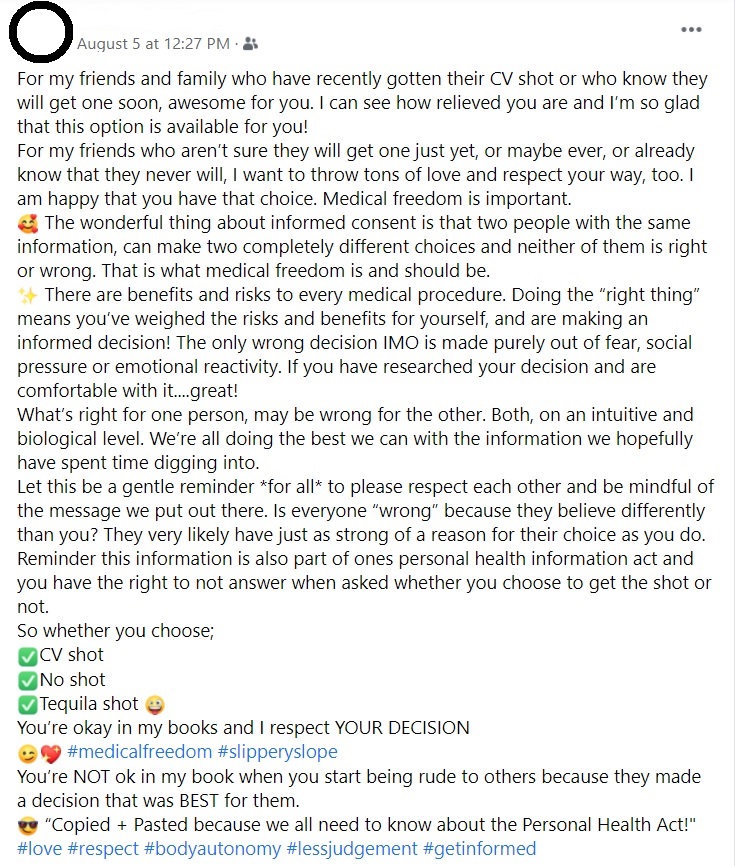Radical Indifference to Truth Spells Disaster for Democracy

In which I respond to a Facebook post about the Covid-19 vaccine that demonstrated an alarmingly casual disregard for truth.
Living in America, you encounter your fair share of bad faith argument. The internet is awash with bad actors who spend their time exploiting the anonymity afforded by social media and maliciously abusing the norms of civil discourse. In other words, trolls. With the Covid-19 pandemic, we’re seeing a variety of fallacious arguments reanimated by bad-faith agitators who pride themselves on lazily crafted objections that sound just compelling enough to the uninitiated or to those who already buy into the particular narrative they’re pressing.
So to start, I’ll share below a couple of pat responses to those objections that readers may find useful the next time you come up against similar talking points. The two I seem to come across most often are arguments from authority and argumentum ad populum (appeal to a majority). They’re deployed in some cases by right-wing partisans who feel the need to register token disagreement with anything they perceive as coming from “the left,” and in other cases by people who simply don’t like being contradicted or corrected after trying to pass off inaccurate information as fact.
This first example relates to those who attempt to dismiss your claims not by examining the claims themselves but by attacking the status of the person making them.
“But you’re not a scientist so why should we trust you?”
Response: You don’t have to trust me, but facts don’t suddenly cease to be facts when they’re conveyed by a non-scientist. If an astronomer says Mercury is the third planet from the sun, their having a PhD doesn’t make them right. And vice versa: If you say Mercury is the first planet from the sun, your not being an astronomer doesn’t make you wrong.
The second comes from people who attempt to parlay the groupthink quotient of their particular social bubble into validating their baseless assertions.
“But most people in this thread agree with me.”
Response: That doesn’t make you right, though. If you’re in a room with nothing but flat-earthers, espousing flat-earth views will earn you unanimous support. It doesn’t mean the earth is flat. Your belief can be shared by everyone with whom you regularly interact and still be contradicted by all observable data.
Both of the above arguments are red herrings as they fail to address the issue or question under debate. They’re meant to distract and derail rather than inform and clarify. It’s best to shut each down quickly before the discussion veers off course. Once focus shifts away from the evidence or claims presented, the troll has won. If you can beat them to the punch, you may have a chance at saving the thread from descending into a state that’s helpful to no one.
Radical Indifference
The above are archetypal bad faith comments, and in all honesty it may be best to block people who insist on engaging in this way. What I want to call attention to here is a different group of people who apparently mean well but who demonstrate a total lack of interest in what is true and factual. Not only do they not know ‘what the facts are’, they don’t care to find out. Worse still, there are in principle no wrong answers on their view — even when it comes to matters of scientific import. If an opinion seems to have been offered sincerely, it’s as valid as anyone else’s; both sides of an issue are equally trustworthy.
I’ve taken to labeling this phenomenon ‘radical indifference’, and I think in the long run it actually poses a greater danger than the obfuscationists who go out of their way to disrupt polite society and thwart substantive conversation. I encountered this mentality most recently as last week by way of a Facebook post from a friend I haven’t spoken to in years. Their post stressed that the decision over whether to get the Covid-19 vaccine is strictly a personal one and therefore worthy of respect on that basis. In my response, I chose not to address the merits of vaccination — both to the vaccinee and the people in their orbit — but rather the general theme of the post and its implications. Below is a screenshot of the post followed by the comment I left under it. I’ve blanked the name and picture as it was not Public.
I’d like to push back on some of the framing here a bit, if I could. I agree, at least in theory, that two people with the same information can reach different conclusions based on their personal values and goals. However, one of the big problems since this pandemic began (and with our national politics more generally, for that matter), is that people on opposing sides are often *not* working from the same information. At all, in fact. And to the extent that the information relevant to decisions such as whether to get vaccinated or whether to wear a mask is based on objectively gathered data, this opens up the possibility that one side is in fact ‘wrong’ — to the extent their conclusions are inconsistent with said data.
From personal experience in having conversations surrounding vaccines and masking, a lot of what passes for “medical freedom” and “personal choice” these days amounts to ignorance or preconceptions rooted in misinformation or partisan bias. These are phrases routinely used as cover for positions or decisions at stark odds with the underlying science/data. That is to say, the reasoning that often gets thrown out once you press someone on their decision to forego the vaccine or masks is largely fallacious and grounded in incorrect or inaccurate information. Not always, necessarily, but when it is, I don’t think we should give that person a pass by chalking it up to “personal choice” or pretending that their position is as valid as anyone else’s.
Because the truth is that not all perspectives/beliefs are equally valid, and I think we should be honest in admitting that. To take a rudimentary example, if someone says Mercury is the third planet from the sun, that person is wrong — objectively so. Likewise, if someone says the flu is more dangerous than Covid-19, or that the vaccines aren’t effective, or that HCQ is a cure for Covid-19, that person is plainly wrong from the perspective of all available evidence. Again, we’re not obligated to excuse them — even if they are our friends or family members — when the evidence is so clearly stacked against them.
Similarly, just because someone says they “researched” a particular issue does not automatically make their opinions valid. It’s not some miraculous word that makes a person worth listening to. It depends on whether that supposed research ever made contact with reliable and trustworthy sources and whether their resulting conclusions can actually be squared with the relevant scientific data. If someone tells you, for instance, that based on their research, Thomas Jefferson was actually the first POTUS and not the third, that doesn’t spontaneously invalidate all of the historical data we have to the contrary. It most likely means this person is mistaken or was led astray by misleading or otherwise inaccurate information.

Appeals to “balance,” “both sides,” “free speech,” “personal choice,” and the like are more often than not a calculated exercise in covering up inadequacy of evidence and the perceived right to muddy scientific debates with nonsense. If we truly believe that facts and evidence are important enough to guide our decisions as a society and as individuals (as opposed to fear, social pressure, and emotional reactivity as you rightly point out), then this should apply to our conversations about the pandemic as well. The notion that it’s all subjective and every opinion, no matter how intelligently arrived at, is equally valid and sound is, I would argue, the real “slippery slope” you should be worried about.
P.S. I want to emphasize that my comment should not be taken to mean that no sound reasons exist to refuse the vaccine or to decline to wear a mask. There are in fact medically legitimate reasons for why one might forego both, though these only apply to a small fraction of the human population. My comment should also not be interpreted as saying that anyone against vaccinating or masks is arguing in bad faith. Some of them are, while some are merely mistaken and misled. Hope that staves off any whataboutism that might follow.
I’m rather proud of this reply, though it stopped the thread cold. I don’t know if my words caused this person to rethink passing along what amounts to a remarkably casual disregard for truth, but either way, posts like this and the meaning behind them are deeply troubling to me. The attitude expressed here is almost anti-epistemological in the way it relativizes truth and evades the mere acknowledgment that there are right answers to be found. The notion that all research conducted on the internet rests on equal footing so long as one is “comfortable” with the decision they reach is similarly bonkers given how hazardous that task can be these days.
Similar sentiments scattered all across the internet — even on comment threads in the Times and the Post — are a tremendously dispiriting sign of decay. There’s such a widespread lack of interest or just lack of ability to actually read and consider what an article says, combined with a knee-jerk opinionism and leading with assertion over working through an argument. To say nothing of the defeatism and cynicism rampant among large swaths of our electorate. My hope is that this is all somewhat temporary, borne of the stress and anxiety that comes when a society’s guiding myths fall apart. My fear, though, is that with the ubiquity and unfettered environment of social media, we’ve lost our ability to think.
Worst case scenario is we’re effectively witnessing the endgame of authoritarian actors and other purveyors of disinformation. The denial of objective truth is an omen hastened along by antidemocratic forces whose goal is much more ambitious than merely reinforcing and popularizing anti-intellectual thought. It is to pull on the threads of democracy itself in an effort to bring down the whole ship. Putin and other autocratic leaders cut from similar cloth seek to disrupt through cyberwarfare the information-gathering process to such a degree that finding facts, and the sources capable of delivering them, seems a fool’s errand. When everyone is trapped in their own respective partisan bubbles, unable to critically think and parse evidence-based reality from abject nonsense, we as a society gradually lose the sense for what counts as reliable information in the first place, allowing fictions and delusions to flourish in its stead. We approach a point of no return where we no longer are guided by logic and reason and exude indifference toward the norms and institutions that keep democracy afloat.
As historian Timothy Snyder writes in On Tyranny: “To abandon facts is to abandon freedom. If nothing is true, then no one can criticize power, because there is no basis upon which to do so. If nothing is true, then all is spectacle. The biggest wallet pays for the most blinding lights.” I worry that we’re now seeing the fruits of chronic disinformation and misdirection close in around us. I worry that the strange power of propaganda has managed to seep into the minds of everyday people who would otherwise not so readily have abandoned fact-based living. I fret over the possibility that our trust in media and other civic institutions has so frayed that we’ve entered a world in which what one believes and what is true are invariably one and the same. I worry that the war over the “information sphere,” to use the terminology of our own intelligence agencies, has already been lost.
I don’t know where we go from here as a nation, or how to restrain our worst impulses that seem to be speeding us toward a dark and uncertain future, but I dearly hope we can find a way to break free before it’s too late.
Further reading:
- Russian Disinformation Targets Vaccines and the Biden Administration
- State Dept. Traces Russian Disinformation Links
- The Problem Isn’t Disinformation, It’s Dismediation
- Review: On Tyranny
- The American Abyss
- What Russia’s Meddling Can Tell Us About Their Motives and Our Indifference
- What is Disinformation?
- Dialogue is Hard. This Blueprint May Help.
- The Problem With Self-Imposed Echo Chambers
- I Debunked a Covid-19 Conspiracy Video
Feature image via Renew America Together



Comments